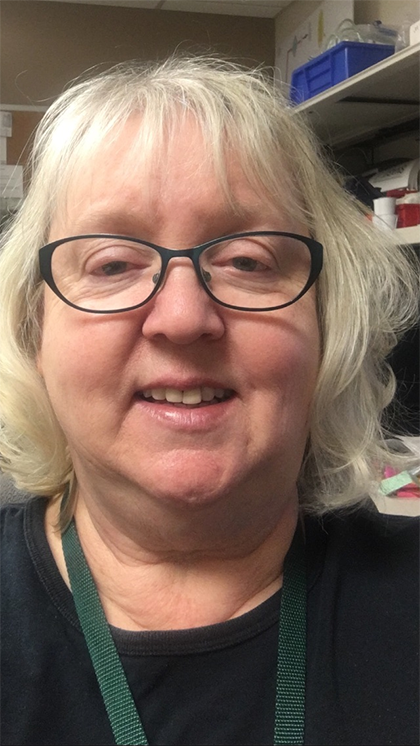

Back when Teresa Zustiak, CRT, CRT-NPS, AE-C, got into the profession of respiratory care it was called “inhalation therapy.” The relatively new field had a high-tech focus that spoke to her desire to break out of the traditional health career mold.
“I knew I wanted to specialize in something different and specific as compared to my friends, who all went to nursing school,” Zustiak said. “I really liked the technical equipment involved and decided to do it.”
After a year spent in adult care, she realized her passion lay in caring for children, and, for the past 40 years, she’s done just that as an RT and now a clinical educator at Children’s Minnesota.
She has especially loved playing a part in the progress that’s been made over those 40 years in sending children with complex medical needs home.
“When I first joined the field, kids did not go home with trach and vent,” Zustiak said.
When she saw a discrepancy in outcomes in some of those children, she decided she could do even more by researching the topic and presenting the results to her colleagues via the AARC OPEN FORUM.
Creating some evidence
The result was her Editors’ Choice abstract at AARC Congress 2018 titled Does Acetic Acid Solution Decrease Tracheostomy Stoma Site Infections Compared to Sterile Water When Used as a Daily Cleaning Task for Patients With Tracheostomy Tube Under One Year of Age?
“I discovered when caring for the complex medical children with trachs that some of them did not have infections at the stoma site, while others did, and it seemed to me it might have been related to the cleaning procedures used on a daily basis,” Zustiak said. “When I started searching for articles pertaining to cleaning solutions, there was no research done on this, only expert opinion.”
Her study was aimed at adding evidence to opinion on the topic.
The hardest part of carrying out the study, says Zustiak, was plowing through the sometimes tedious work necessary to ensure quality research. The statistical analysis of the data that was collected took hours of her time, and she also invested considerable energy into making sure her abstract clearly communicated the results.
It was all worth it, though.
“The best thing about doing research is finding your inner strength to continue on, even when you don’t even seem to like your project anymore!” she said. “It is so rewarding to find science-based results that will improve patient care without risk or cost.”
Her best advice
Teresa Zustiak has three great bits of advice for anyone seeking to conduct a clinical research study:
- Find a mentor who has done this before and can advise you.
- Pick a research topic that you are truly curious about and where you want to make a change, not something that you are researching for the sake of doing research.
- Hang in there. There will be times you when you will say, “Why am I doing this, it is too difficult, I want to stop!” Just keep moving forward.
The 2019 OPEN FORUM will take place at the AARC Congress in New Orleans, Nov. 9-12.





